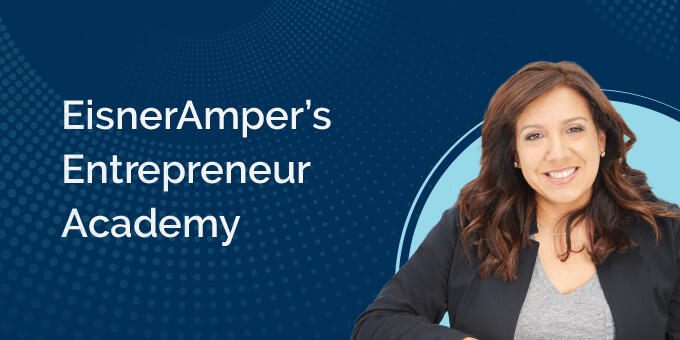Entrepreneur Academy
- Published
- Mar 15, 2023
- Topics
- Share
Though often strapped for cash, startups are finding new and creative ways to remain competitive. In this video, you’ll find out about alternative compensation considerations and strategies as we explore ways to engage and retain key stakeholders in ever-changing markets.
Transcript
Mary Rizzuti:
My name is Mary Rizzuti and I'm the managing director of compensation resources part of EisnerAmper's advisory group. We have been diligently working on compensation strategies that address the ever-changing markets we are experiencing both from a human capital perspective as well as a business perspective.
For this segment, I will be focusing on total rewards in startup companies. We will touch upon
- base salary
- variable pay
- equity
- company culture and
- change management
Historically and even more so now startups have needed to be creative and how they attracted highly skilled talent in an environment where cash may not always be plentiful. The human capital strategy was typically--add as you go and negotiate what you need. What resulted were individually constructed compensation packages based on demands for certain skills, the need for retention and continuity and motivation of a buy in mentality of the candidates. This was accomplished by offering a base salary that was sometimes below market with upside potential in the form of some type of long term incentive like phantom stock or real equity. Many individuals were attracted to working for a startup company simply because of the allure of being part of an innovative environment.
However, in the midst of volatile labor market startup companies are now revisiting their total rewards philosophies recognizing that below market based salary is not always best practice in an industry that is hungry for highly skilled individuals.
Is that whatever an employee or applicant demands and negotiate? Is it what a company can afford to pay? Is it solely driven by market data? The answer is a combination of all of the above.
First and foremost affordability is a key driver. But affordability may be measured in different ways in different companies. While the company may have just received a round of financing, the question is always how can we best utilize the capitals that we have. Investors will expect to see their investment at work producing results rather quickly. Thoughtful decisions around what a competitive pay package looks like for a specific position are critical. Layer in impacting factors such as concerns about internal equity and the increase in the number of states that have pay transparency laws and it is evident that one size does not fit all when determining best fit compensation.
While market data is important it certainly provides a good baseline for compensation package design it, doesn't always provide the final determination of what the appropriate level of compensation should be for a physician or what its distribution should be between base salary, variable pay and equity. Individuals may bring a varied skill set to their position, wear many hats within the company as well—how do you evaluate those skills? Competency models are being used more frequently in these scenarios. Startups change as they grow and as a result the positions within the company's change. Developing career ladders position progression opportunities are all becoming more commonplace in startup environments. Equally important and challenging is designing performance based pay program.
Identifying performance metrics within an environment that is constantly changing and influenced by funding constraints requires focused time to identify goals that connect to the company strategy while remaining fluid enough to flex with the company when necessary. There is greater pressure on founders to devote time to developing a compensation philosophy that connects with the business strategy and evolving culture of the company. Many times startups draw from a talent pool where individuals have very different backgrounds—some may have come from other startups other from corporate backgrounds. This difference sometimes creates misalignment in management styles and perspectives on pay philosophy which impacts company culture.
As startups grow the need for more internal structure becomes very important. Change management and deliberate communication policies around the new programs become imperative. We find that this is the pivot point where startups begin to outsource their compensation program design as well as their HR needs recognizing that they are at a point where they need more support and expertise in these areas.
It is evident that the landscape is changing, and founders are acknowledging the need to step away from the think tank just long enough to get much needed human capital strategies in place that will support making their ideas a reality.
Compensation continues to be a dynamic topic in every industry, and we will continue to monitor and inform on emerging trends.
Entrepreneur Resource Hub
EisnerAmper’s Entrepreneur Academy “EA2” offers early-stage startups continuous learning opportunities—from fundraising to mitigating risk to growing their businesses.
What's on Your Mind?
Start a conversation with Mary
Receive the latest business insights, analysis, and perspectives from EisnerAmper professionals.



